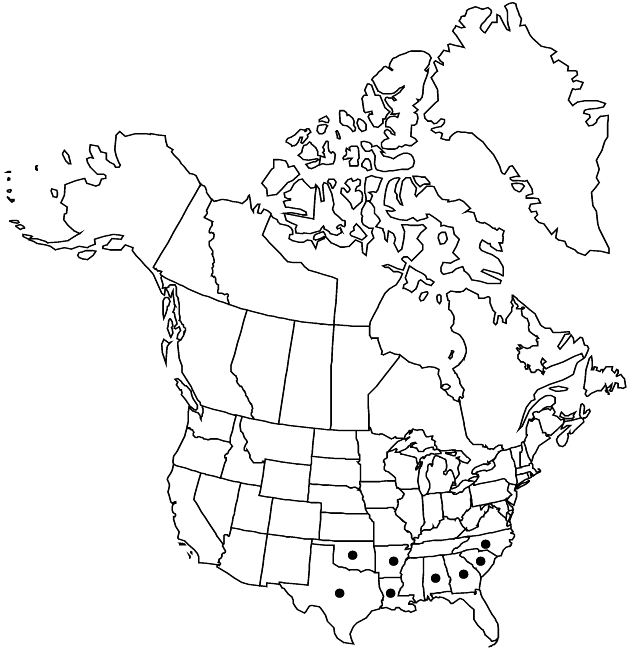Difference between revisions of "Verbesina walteri"
Sida 1: 253. 1964.
FNA>Volume Importer |
imported>Volume Importer |
||
| (6 intermediate revisions by 2 users not shown) | |||
| Line 7: | Line 7: | ||
|year=1964 | |year=1964 | ||
}} | }} | ||
| − | |basionyms={{Treatment/ID/ | + | |special_status={{Treatment/ID/Special_status |
| + | |code=E | ||
| + | |label=Endemic | ||
| + | }} | ||
| + | |basionyms={{Treatment/ID/Basionym | ||
|name=Athanasia paniculata | |name=Athanasia paniculata | ||
|authority=Walter | |authority=Walter | ||
| + | |rank=species | ||
| + | |publication_title=Fl. Carol., | ||
| + | |publication_place=201. 1788, | ||
}} | }} | ||
|synonyms= | |synonyms= | ||
| Line 26: | Line 33: | ||
|elevation=10–300 m | |elevation=10–300 m | ||
|distribution=Ala.;Ark.;Ga.;La.;N.C.;Okla.;S.C.;Tex. | |distribution=Ala.;Ark.;Ga.;La.;N.C.;Okla.;S.C.;Tex. | ||
| − | |discussion=<p>Verbesina virginica may be no longer present in Georgia and North Carolina.</p> | + | |discussion=<p><i>Verbesina virginica</i> may be no longer present in Georgia and North Carolina.</p> |
|tables= | |tables= | ||
|references= | |references= | ||
| Line 35: | Line 42: | ||
-->{{#Taxon: | -->{{#Taxon: | ||
name=Verbesina walteri | name=Verbesina walteri | ||
| − | |||
|authority=Shinners | |authority=Shinners | ||
|rank=species | |rank=species | ||
| Line 49: | Line 55: | ||
|publication title=Sida | |publication title=Sida | ||
|publication year=1964 | |publication year=1964 | ||
| − | |special status= | + | |special status=Endemic |
| − | |source xml=https:// | + | |source xml=https://bitbucket.org/aafc-mbb/fna-data-curation/src/2e0870ddd59836b60bcf96646a41e87ea5a5943a/coarse_grained_fna_xml/V19-20-21/V21_253.xml |
|tribe=Asteraceae tribe Heliantheae | |tribe=Asteraceae tribe Heliantheae | ||
|subtribe=Asteraceae (tribe Heliantheae) subtribe Ecliptinae | |subtribe=Asteraceae (tribe Heliantheae) subtribe Ecliptinae | ||
Latest revision as of 20:10, 5 November 2020
Plants 100–400 cm (perennating bases ± erect, internodes winged, at least proximal). Leaves all or mostly alternate (proximal usually opposite); blades lance-elliptic to lanceolate or lance-linear, 10–20 × 2–7 cm, bases ± cuneate, margins coarsely toothed to subentire, apices acute, faces ± hirtellous. Heads 8–35+ in corymbiform to paniculiform arrays. Involucres ± saucerlike, 8–10 mm diam. Phyllaries 12–15+ in 1–2 series, ± spreading, oblanceolate to linear, 2–5+ mm. Ray florets 0. Disc florets 40–60+; corollas ochroleucous to white. Cypselae dark brown to blackish, obovate, 3–4.5+ mm, faces ± strigillose; pappi 1–2 mm (sometimes shorter scales between awns). 2n = 34.
Phenology: Flowering Aug–Sep.
Habitat: Bottomlands, flood plains, borders of woodlands
Elevation: 10–300 m
Distribution

Ala., Ark., Ga., La., N.C., Okla., S.C., Tex.
Discussion
Verbesina virginica may be no longer present in Georgia and North Carolina.
Selected References
None.